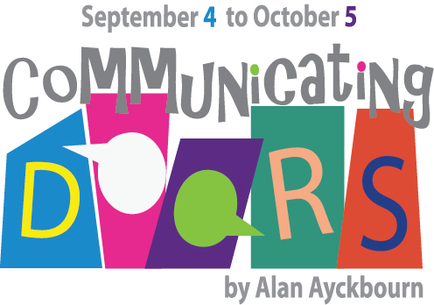 Reposted from www.HedgerowTheatre.org As it turns out, theatre is about conflict. Who knew? I think this was discussed sometime early on in my college career, but I seemed to of missed the lesson at some point or another. Somewhere between the spontaneity of improv and the introduction of inner monologue, the core of theatre can be lost. Conflict comes in so many shapes, from relationship dramas to time-traveling-prevent-the-murder-fiasco. No matter the play, the scene, the monologue if there is theatre, if there is acting going on, if there is life, there must always be a conflict present. Even if "you" are a one-dimensional, plot pushing, psychopath bent on destruction and validation, "you" must have conflict within the character. Enter Julian. When we meet this character for the first time in Communicating Doors he is the prototypical bad guy: suit, slick hair, and devilishly handsome. He is lean. He is mean. He is only concerned about the green (and Reece, but that didn't rhyme). Julian drives the conflict of Alan Ayckbourn's thriller. In fact, he is the thriller element of the show; however, and this is key, even though Julian does all these horrific things, and although he is driven by the will to win (personal character choice I might add), he must have more than one side. Trust me, I relish in this bad guy. It is fun to play the Iago's, the Scar's, and the Julian's of the world, but we must not beat the audience over the head. Is there anything worse than an actor screaming, in the subtext, his intentions at the audience? "Hey! Hey! I'm evil! Do you get it! GET IT!" As our Artistic Director Jared Reed aptly put it, "I don't have to make Hamlet sad. The playwright did that for me." The fun, or one of the fun things, about playing great characters, whether it be Hamlet or Julian, is finding all the idiosyncrasies about them: that is, discovering the details that make us up as people. We are all of two minds. Whether it be the conscious or the subconscious, or the limbic and the neocrotex, man loves to argue. And what is theatre but a brilliant argument? As Anthony Hopkins put it, Hitler is human. The scary thing about Hitler was not that he was some monster from another planet, but that he was born and raised right here, that he is one of us. The scary thing about bad men is with a few wrong choices, it could be us. Therefore, as an actor it becomes our job to find those human moments, those contrasting choices of self, to make up the character. Ayckbourn gave me everything I needed to be bad. What I had to do, as guided by our director Liam Castellan, is find ways to, "lighten Julian up." What makes him laugh? What makes him sad, not angry, but actually feel? The fun of characters like this, is that each and every night I get search for those answers. Internally, I have playable goals. There are the goals of the script, world domination and all that polka, and there are the personal goals like finding the playfulness the human side of a man so clearly disturbed, and they all add to the experience. When we first started working on this project, it was, and still is, so easy to get hung up on those elements of intimidation and fear. Yet, as Executive Director Penelope Reed pointed out, when we see the joy of his acts and the fun he has in these moments of horror, we see ourselves and that, is truly scary. Good playwrights give us all the tools we need. Men such as Shakespeare and Shaw, write so well that the "acting" comes from the actor's enjoyment of the role. Ayckbourn gave me every brassy bass and screechy violin note I needed. Half of the equation was finished. Now, each and every night I play Julian, I go up there in search of the other side of that half. Therefore, "Then what's he that says I play a villian?" Care to answer? If so, "I'll be waiting for you. Don't you worry. I'll be waiting for you."
1 Comment
|
Brock D. VickersThis is the beginning of a new part of life: a habit: an idea: a routine to dig at what makes a man great. Archives
January 2024
Categories |
 RSS Feed
RSS Feed